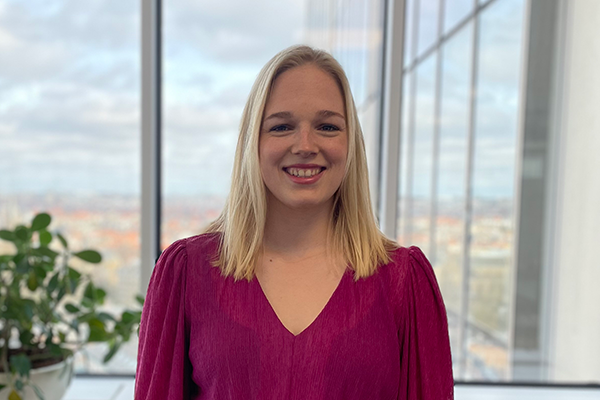Whether you are just entering the job market or looking for a new professional challenge: there comes a time when you need to get behind your PC to write or update your CV. But what does a potential employer expect to see on your CV? Is a photo a must? Should you mention that you don't have a driver’s licence (yet)? Is it required to mention your age and nationality?
Gitte Peeraer, Talent Acquisition & Learning Specialist at staffing specialist Walters People explains.
The purpose of your CV is to give a potential employer a good impression of you, and to get invited for a job interview. Gitte briefly summarizes which elements are essential on your CV:
Personal details: your full name, phone number and email address are required, so potential employers can reach you easily.
Education: if you continued your studies after secondary school, mention the university or college, the graduation year and the degree you obtained. If you did not complete a particular education, but it is relevant to the job you are applying for or it has made a positive contribution to the person you are today, you can also mention it. Just be sure to mention you didn’t finish it, so as not to give any wrong impressions of obtaining that degree as well.
Work experience: start with your most recent job and limit each work experience to the core responsibilities you had. Remember to include the name of the organization, your job title and the start and end dates for each work experience. If you already have several years of experience and did several short interim assignments at the beginning of your career, there is no need to list them all in detail. If you are applying for your first job, you obviously do not have much work experience yet. In that case, it may be useful to mention any internship experience, student jobs and voluntary work.
Skills: your skills describe what you can do and the knowledge you have. Showcase both your hard skills and soft skills on your CV but keep it concise and be honest. Keep in mind that during your job interview you may be asked to give an example of certain skills. So, prepare for this as well.
As Talent Acquisition & Learning Specialist, Gitte regularly gives workshops and CV advice, and she is often asked what exactly should and should not be mentioned on a CV. Let’s look at some elements that are often in doubt as to whether they should be on a CV.
Age or date of birth
Personal details can usually be found at the top of the CV. Gitte: "Whether you mention your age or date of birth is entirely up to you. By the way, age discrimination is prohibited by law. Even if you don't explicitly mention your age on your CV, an employer will be able to figure it out roughly based on your year of graduation or the number of years of experience you have listed."
Marital status and children
"Whether you are married, cohabiting or have children doesn't necessarily have to feature on your CV. Whatever you decide: keep it simple, for example: married, 2 children. It's best to leave out the name and age of the children," says Gitte.
Address
Putting your address on your CV dates to the days when CVs and motivational letters were sent by post. Today, that no longer happens, so including your full address is not a necessity. "Still, it can be interesting for an employer to know where you live. This allows him to estimate what your travel time would be, and depending on the position, your place of residence can indeed be an asset. Think, for example, of an account manager position for a specific region. When your potential employer sees on your CV that you live in that region, you may be one step ahead of other candidates who live further away. If you prefer not to display your full address on your CV, limit yourself to your place of residence only, or at least indicate the region where you would like to work," advises Gitte.
Photo
A good CV gives your potential employer a clear picture of you in only a few minutes. A photo helps, but it is certainly not a must, and a potential employer should never ask for it in the job advert. If he or she still wants to know what you look like, they can consult your LinkedIn profile. Gitte:
"If you choose not to post a photo there either, bear in mind that potential employers may google your name and stumble on images from your private life. If you prefer not to, it's best to adjust your privacy settings on your social media channels, or make sure you have a professional profile picture on LinkedIn or on your CV."
If you decide to add a photo to your CV or LinkedIn profile, select a neutral photo in a neat and professional outfit, over a holiday photo in swimsuit. Get a recent photo showing your entire face and put it at the top left or right of your CV, next to your name.
Language knowledge
Do you put your language knowledge on your CV even if it is not relevant to the job you are applying for? And what if you have only a moderate knowledge of other languages besides your mother tongue? "It's a good idea anyway to include every language you speak on your CV in the skills section as well, particularly if you are applying for an international position or with an international organization. But don't overestimate yourself, otherwise you will fall through during your job interview anyway," warns Gitte.
If the job advert does not ask for specific language skills, it is still a good idea to list the languages you speak, supplemented with a scale of native-fluent-good-sufficient-moderate. If you speak a language better than you can write it, then you may want to differentiate here too, by language.
Driver’s license and own car
It is not compulsory to mention on your CV whether or not you have a driver’s license, but in certain cases it can be useful, particularly if driving is the main task of the job you are applying for. If you respond to a vacancy for a commercial position or any other job that requires you to be on the road frequently, it is obviously appropriate to mention that you have a driver’s license.
"If you are applying as a graduate, or responding to a vacancy with an organization that is less accessible by public transport, you may also mention that you own a car. If you don't (yet) have a driver’s license and/or your own car, don't lie about it on your CV either. Just don't mention it. If you are in the process of taking driving lessons and hope to get your license soon, then you can possibly mention it that way in your cover letter or CV."
Whatever you decide to put on your CV and what not, keep it concise. After all, with your CV, you want to grab a potential employer’s attention to find out more about you. During the job interview, you will have the chance to dive into detail about the most interesting aspects of your CV. Good luck!
Find out more?
Check out our other tips and advice to develop your career. Ready to start your job search? View our latest jobs.













